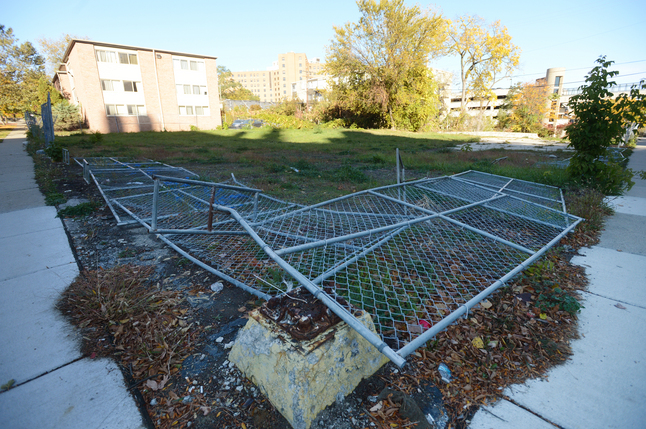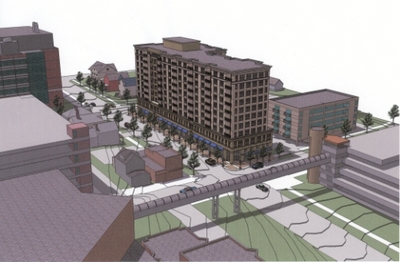
The future of vacant property on Glen Street in Ann Arbor is unclear as the Glen Ann Place site plan is set to expire soon.
Melanie Maxwell | AnnArbor.com
The site, located on a half-acre property on Glen between Catherine and Ann streets, is home to a decade-long effort by Illinois developer Joseph Freed & Associates to build Glen Ann Place, a nine-story mixed-use building.
The project, which would be located across the street from a parking garage and would abut two other apartment buildings, calls for nine stories of apartments with lower level commercial space. It’s located in the city’s Old Fourth Ward Historic District.
But as the site plan for the project is set to expire in November — and with the developer owing more than $80,000 in back taxes — questions remain as to what’s next for the property.
A tangled history
Once occupied by a gas station, parking lot, small commercial building and two historic houses, the site has been fenced and vacant for years. Today, the fence has fallen down in parts around the lot and weeds have sprouted on the property.
Freed assembled the five parcels more than a decade ago, and then received approval from Ann Arbor City Council for the Glen Ann Place project in 2005. But when Ann Arbor’s Historic District Commission (HDC) then rejected the proposal to demolish the two historic homes on the site and to build the project, Freed appealed to the state’s Historic Preservation Review Board.
According to state documents, the Review Board affirmed the HDC’s denial to demolish the houses, prompting a lawsuit from Freed.
A consent judgment in 2007 ended the litigation, and Freed was granted approval to move forward with the project — given it was reduced in height from the original 10-story proposal and received facade improvements. There’s also an agreement that the developer would make a $1.008 million contribution to the city’s affordable housing trust fund if the project is built.

A rendering from 2010 of the Glen Ann Place project on Glen Street in Ann Arbor
Rendering by Meier Group Architects
Freed proceeded to demolish the buildings on the site, but activity at the property then ceased.
In 2010, Freed requested a five-year site plan extension for Glen Ann Place, citing financing troubles and the economic downturn. The company was granted a two-year extension, and that is set to expire this November.
“The Glen Ann Place project cannot proceed on its projected schedule because of economic conditions affecting demand for residential and commercial space and trauma and turmoil in the financial markets,” a Freed representative wrote in a 2010 memo to the city.
“However, ownership of the Glen Ann Place property wants to pursue an extension of the time to start the project because it believes that positive changes in market demand and access to financing will occur in the reasonable future,” the memo continues.
At the same time, Freed lost or sold two of its other Ann Arbor properties as it battled with lender Bank of America: the Ashley Terrace high-rise returned to the lender in 2010 and was later sold, and Freed sold the student high-rise Sterling 411 Lofts.
Development potential
City Planning Manager Wendy Rampson said the city met with a Freed representative in mid-summer and the company was “exploring” its options for the Glen Ann Place site.
“They didn’t give us an indication one way or another on what they wanted to do,” she said.
Representatives from Freed did not return multiple requests for comment.
According to county materials, Freed owes $88,046 in back taxes on the five parcels. The property would enter tax foreclosure early next year if the taxes aren’t paid.
“This is a common story: In 2005, you’re hot to do a big development, and by ’08 and ’09, nobody had any money,” said Washtenaw County Treasurer Catherine McClary. “If (the owners) don’t get a hardship extension or they don’t pay up the taxes for 2010 by February of 2013, it would go into foreclosure.”
She added: “But they could have a plan — without us ever knowing — to pay on a certain day.”
Rampson said if Freed does in fact request another site plan extension, the city and HDC would consider the taxes owed when making its decision.
With the city — particularly the downtown area — in the midst of an intense housing development boom, local commercial real estate broker Jim Chaconas said he’s taken notice of the Glen Ann Place property.
He said the “terrific” location, along with the demand for housing in that area, even triggered him to make an offer on the property. He said Freed never responded to the offer.
Still, Chaconas said, there are “holes” in the site plan.
“That site plan wouldn’t work,” he said. “It had too much retail and too much office. It’s too big, it has some environmental concerns and you’ve got the (affordable housing) donation to the city you’d have to restructure the whole deal.”
Mayor John Hieftje told AnnArbor.com last month he thinks the Glen Ann Place project is a “great idea” in terms of providing housing for people working at the medical center.
“Hopefully somebody’s going to come in and revive that,” he said.
Lizzy Alfs is a business reporter for AnnArbor.com. Reach her at 734-623-2584 or email her at lizzyalfs@annarbor.com. Follow her on Twitter at http://twitter.com/lizzyalfs.